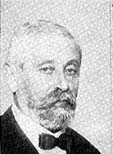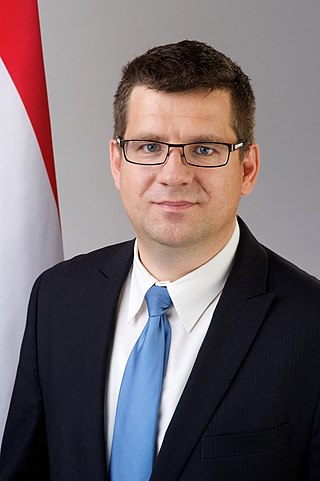Related Research Articles

Péter Boross is a retired Hungarian politician and former member of the Hungarian Democratic Forum (MDF) who served as Prime Minister of Hungary from December 1993 to July 1994. He assumed the position upon the death of his predecessor, József Antall, and held the office until his right-wing coalition was defeated in election by the Hungarian Socialist Party (MSZP), which was led by his successor Gyula Horn. Prior to his premiership, Boross functioned as Minister of Civilian Intelligence Services (1990) and Minister of the Interior (1990–1993). He was also a Member of Parliament from 1994 to 1998 and from 2006 to 2009.

Farkasréti Cemetery or Farkasrét Cemetery is one of the most famous cemeteries in Budapest. It opened in 1894 and is noted for its extensive views of the city.
Népszabadság was a major Hungarian newspaper which was formerly the official press organ of the Hungarian Socialist Workers' Party during the Hungarian People's Republic.
István Mészáros was a Hungarian Marxist philosopher. Described as "one of the foremost political philosophers of the late twentieth and early twenty-first centuries" by Monthly Review, Mészáros wrote mainly about the possibility of a transition from capitalism to socialism. His magnum opus, Beyond Capital: Toward a Theory of Transition (1995), was concerned not only with this theme but provided a conceptual distinction between capitalism and capital, and an analysis of the current capitalist society and its "structural crisis". He was interested in the critique of the so-called "bourgeois ideology", including the idea of "there is no alternative", and he also elaborated analysis on the failures of "real socialism".

László Garai was a scholar of psychology: studies theoretical psychology, social psychology and economic psychology.

Miklós Vámos originally Tibor Vámos, is a Hungarian writer, novelist, screenwriter, translator and talkshow host, who has published 33 books.

Népszava is a social-democratic Hungarian language newspaper published in Hungary.

Ilona Duczynska was a Polish-Hungarian-Canadian revolutionary, journalist, translator, engineer, and historian. Her husband was Karl Polanyi and her daughter is Kari Polanyi Levitt.
An Imaginary Report on an American Rock Festival is a Hungarian musical by composer Gábor Presser, lyricist Anna Adamis and book writer Sándor Pós based on the short novel of the same name by Tibor Déry. The musical premiered in 1973, and being the first successful Hungarian rock musical opened the way for popular music to Hungarian theatres and literature. It is set in a U.S. rock festival and tells a story of a married Hungarian immigrant couple.

Jozsef Wolfner was a Hungarian publisher, founder of the publishing house Singer and Wolfner.

Miklós Seszták is a Hungarian jurist and politician. He served as Minister of National Development in Viktor Orbán's third cabinet from 2014 to 2018. He was elected Member of Parliament for Kisvárda, Szabolcs-Szatmár-Bereg County in 2010. He is one of the vice presidents of the Christian Democratic People's Party (KDNP).

András Kenessei is a Hungarian art historian, writer and journalist.

Krisztián Grecsó is a Hungarian writer, poet and editor.

Magvető is a Hungarian book publishing company based in Budapest. It primarily publishes domestic and international works of literary fiction.
Sándor Haraszti was a Hungarian journalist and politician.

Dávid Baróti Szabó was a Hungarian Jesuit priest, poet, writer and linguist.
References
- ↑ József Deák (2014). "The Police, then Interior Review for the Forming of the Science of Law Enforcement; from its Beginning to the Change of the Political System". West Bohemian Historical Review. 4 (2): 241.
- 1 2 3 4 5 Péter Agárdi (15 January 2014). "Pándi Pál Kritikája és a Kritika Pándija". nol.hu (in Hungarian). Retrieved 11 May 2023.
- 1 2 3 4 "Kritika 1963-2017". arcanum.com (in Hungarian). Retrieved 12 May 2023.
- ↑ Pal Miklos; Jozsef Szili (1970). "Recent Disputes on Literary History among Hungarian Critics". New Literary History . 2 (1): 107. doi:10.2307/468591. JSTOR 468591.
- 1 2 Péter Hajdu (2017). "The Oppressive and the Subversive Sides of Theoretical Discourse". In Călin-Andrei Mihăilescu; Takayuki Yokota-Murakami (eds.). Policing Literary Theory. Leiden: Brill. p. 142. doi:10.1163/9789004358515_009. ISBN 9789004358515.
- 1 2 3 "Kritika". Euro Topics. Retrieved 5 October 2013.
- ↑ "World Newspapers and Magazines. Hungary". Worldpress. Retrieved 5 October 2013.
- ↑ "Szerkesztik". Kritika (in Hungarian). Retrieved 5 October 2013.